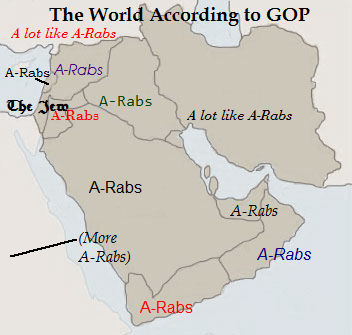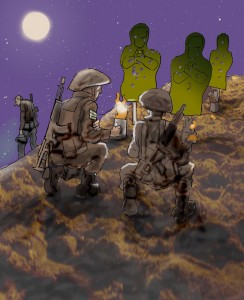Gershom Gorenberg
In my latest American Prospect column, I show that the Republican candidates for president are either incompetent or delusional in their grasp of world affairs. But which is it:  Are they D students, or do they live in an alternate universe? And which one’s delusions put him the most parsecs from Earth? You, the readers, can decide!
Are they D students, or do they live in an alternate universe? And which one’s delusions put him the most parsecs from Earth? You, the readers, can decide!
If there’s anything that can produce more anxiety than watching the Republicans pick a presidential candidate, it’s watching the process from Israel.
Yes, I know that the Republican candidates—well, except for Ron Paul—all love Israel. Newt Gingrich is still in the race because of the cash his super PAC got from casino mogul Sheldon Adelson, whose other political investments include financing an Israeli newspaper that exists to promote Benjamin Netanyahu. Rick Santorum has just been endorsed by the high council of theocons, who are sure they understand Israel’s importance better than the Jews do. Mitt Romney’s foreign-policy platform restates—in more polite but equally counterfactual terms—his accusation of last year that “President Obama has thrown Israel under the bus.”
This is exactly what makes me nervous. These candidates would love Israel to death. What’s scary is not just that any Republican from the class of ’12 is likely to replace Barack Obama’s uneven support for Israeli-Palestinian peace with the George W. Bush-style malignant neglect. It’s not just that the Middle East as a whole is downstream from America: Our region gets swamped by the mistakes made in Washington. What’s really scary is that the way that Republicans—including Ron Paul—talk and act about Israel shows that their grasp of world affairs ranges between incompetent and delusional.
Let’s start with Santorum’s statement—video-recorded at an Iowa campaign event—that “all the people who live in the West Bank are Israelis. They’re not Palestinians. There is no Palestinian.” It’s worth watching how Santorum reaches this remarkable conclusion. The West Bank, he says, is part of Israel, just as New Mexico is part of the United States. “It was ground that was gained during war,” he says. Challenged that it might make a difference that the “annexation” was recent, the candidate insists, “No, it doesn’t matter. … It is legitimately Israeli country.” And since the land is Israel’s, he infers, everyone living on it is an Israeli. Presto, the Israeli-Palestinian conflict evaporates.
Read more











